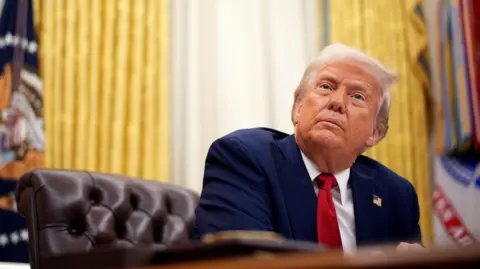ARTICLE AD BOX
Tiffany Wertheimer
BBC News

 Getty Images
Getty Images
In his first few weeks back in the Oval Office, US President Donald Trump made several extraordinary decisions on foreign policy.
He threatened to annex Greenland, announced plans to "take over" Gaza, and started to remove the US from the World Health Organization (WHO) and the UN Paris climate agreement. He has also shuttered the US Agency for International Development (USAID), the government's main overseas aid agency.
Many of these moves are not very popular with ordinary Americans, according to a recent survey by the Pew Research Centre. It surveyed 3,605 US adults in late March - just before Trump imposed sweeping trade tariffs on countries around the world.
Here are four takeaways from the Pew research.
The US should not try to take over Greenland or Gaza, most say
Trump has increased his rhetoric on "getting" Greenland, and Vice-President JD Vance recently took a controversial trip to the Arctic island.
But Pew found that most survey respondents (54%) did not think the US should take over the Danish territory. When asked if they think Trump would actually pursue the plan, 23% thought it was extremely likely, but a greater number (34%) said they believed he would not carry through with it.
- Denmark and Greenland show united front against US 'annexation' threats
- Andrew Harding: Vance makes ominous pitch to Greenland
Trump also proposed an American takeover of the Gaza Strip, resettling two million Palestinians in neighbouring countries with no right of return. This would violate international law and has been described as "tantamount to ethnic cleansing" by the UN.
Of those surveyed, 62% of Americans opposed such a move, compared to 15% who favoured it. Opinions were divided as to whether Trump was likely to actually pursue it. Again, the greater number (38%) thought it very or extremely unlikely.
A greater number disapprove of ending USAID and withdrawing from WHO
Trump signed executive orders to remove the US from the World Health Organization (WHO) and Paris Agreement on climate change, and said USAID largely would be shut down.
More Americans disapprove than approve of such moves, the survey suggests - although the results are not a landslide.
- 45% disapprove of ending USAID programmes (compared with 35% who approve)
- 46% do not agree with leaving the Paris agreement (32% approve)
- 52% disapprove of leaving the WHO (32% approve)
Trump favours Russia too much, many feel
At the start of his second presidency, Trump said he would "work together, very closely" with Russian President Vladimir Putin to end the war in Ukraine - a very different approach to that of his predecessor, Joe Biden.
The Pew research found 43% of respondents thought Trump favoured Russia too much - a higher number than the 31% who said he was striking the right balance between both sides.
Since the survey was conducted, however, Trump's mood appears to have changed. He has said he is "very angry" with Putin over Ukraine negotiations.
Meanwhile, Trump's relationship with Israeli Prime Minister Benjamin Netanyahu has grown increasingly close this year.
Answering a question about whether Trump was favouring Israelis or Palestinians, 31% of those surveyed thought he favoured Israelis too much. Close behind at 29% were those who thought Trump was striking the right balance.
Larger than either of these, however, was the group of respondents who were not sure (37%). Just 3% felt he was favouring Palestinians too much.
Republicans back Trump's plans
While Pew Research Centre is non-partisan, those surveyed were not.
The results showed that most of the respondents (64%) who described themselves as Republican - or Republican-leaning - supported the move by the Republican president to end USAID, for example.
That compared to just 9% of opposing Democrats - or Democratic-leaning - respondents who felt the same way, indicating a high level of polarisation.
Generally, it is older adults who support Trump's foreign policy actions, more than younger adults, the research suggested.
Pew also asked about tariffs on China, although this research was carried out before the situation escalated sharply into the trade war that is now under way.
Generally, more Americans said the tariffs would be bad for them personally, but those who were Republican, or leant more towards that party, believed the tariffs would benefit the US.

 1 month ago
25
1 month ago
25








 English (US) ·
English (US) ·